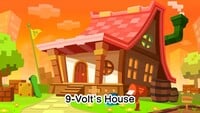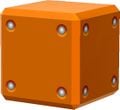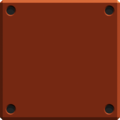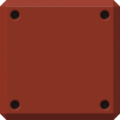Empty Block
- This article is about the recurring object also referred to as "Brown Block" in Super Mario World. For the object from Wario Land 4, see brown block.
| Empty Block | |||
|---|---|---|---|
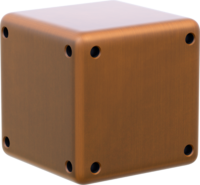 Artwork from Super Mario 3D World | |||
| First appearance | Super Mario Bros. (1985) | ||
| Latest appearance | Super Mario Galaxy + Super Mario Galaxy 2 (2025) | ||
| |||
| |||
- “This block's already been hit. You can hit it all you want, but nothing else will happen.”
- —Goombella, Paper Mario: The Thousand-Year Door
An Empty Block[1] (sometimes referred to as a Steel Block[2] or simply as a Block[3][4]) is a type of block in the Super Mario franchise that usually replaces a ? Block, an item-holding Brick Block, or a Coin Block when the player strikes it, though it sometimes is naturally already in an "empty" state. Empty Blocks tend to be visually based on ? Blocks from their respective games, only brownish and lacking their mark.
History[edit]
This section is a stub. Please consider expanding it to include any missing information. Specifics: Be more specific for the Paper Mario and Mario & Luigi series sections, add Wario Land series coverage
Super Mario series[edit]
Super Mario Bros. / Super Mario Bros.: The Lost Levels[edit]
Empty Blocks debut in Super Mario Bros. and recur in Super Mario Bros.: The Lost Levels. In these games, they are colored to match the level's theme, like Brick Blocks and ? Blocks. Fire Bars often rotate around Empty Blocks.
Super Mario Bros. 3[edit]
After an absence in Super Mario Bros. 2, Empty Blocks return in Super Mario Bros. 3; both these blocks and ? Blocks are yellow (brown in remakes) in this game. Big Empty Blocks also debut in this game, being the result of hitting Giant ? Blocks; they also form part of the level designs of Worlds 4-2 and 4-5. Certain bonus rooms are made up of cyan or periwinkle Empty Blocks with transparent bolts; these are replaced with more standard walls in Super Mario All-Stars.
Super Mario Land[edit]
Empty Blocks return in Super Mario Land, acting as in prior games. They also occur naturally empty, mostly as bonus room terrain.
Super Mario World[edit]
In Super Mario World, Brown Blocks[5] have small, closed, angry eyes in their sides' centers, rather than their usual holes. If the player hits a blue Switch Block, all Brown Blocks turn into coins and vice versa for a short time. In their first appearance, Snake Blocks look like ordinary Brown Blocks, and the angry eyes from Super Mario World's Brown Block design would continue to be used on Snake Blocks and Ice Snake Blocks in later games in the Super Mario series.
Super Mario Land 2: 6 Golden Coins[edit]
In Super Mario Land 2: 6 Golden Coins, Empty Blocks, looking like they do in Super Mario World (albeit with their eyes being slanted at a steeper angle), appear in the same capacity as in prior games.
New Super Mario Bros. series[edit]
Empty Blocks return in the New Super Mario Bros. games, working as they did previously; in the first three of these games, they are color-coded according to their environment, as in Super Mario Bros. They can now be broken by Mega Mario (in New Super Mario Bros. and New Super Mario Bros. 2) or stronger enemies, such as Broozers (in all games), King Bills (in New Super Mario Bros. Wii and New Super Mario Bros. U), and Super Bowser (in New Super Mario Bros. Wii).
Big Empty Blocks also return in red and orange Toad Houses in New Super Mario Bros. (as a result of hitting their respective blocks, either Roulette Blocks or Mega ? Blocks), World 6-5 in New Super Mario Bros. Wii, and Soda Jungle in New Super Mario Bros. U; Long Empty Blocks return in New Super Mario Bros. 2.
Super Mario Galaxy / Super Mario Galaxy 2[edit]
Empty Blocks appear in a 3D Super Mario game for the first time in Super Mario Galaxy, and they return in Super Mario Galaxy 2 and Super Mario Galaxy + Super Mario Galaxy 2; however, they are always found naturally empty, as Brick Blocks always shatter when hit, even if they contain items, and ? and Coin Blocks vanish once used up. The Empty Blocks feature smooth, silver bumps within the holes on the corners of the faces of the blocks.
Giant Empty Blocks also appear in the Supermassive Galaxy in Super Mario Galaxy 2, where they are part of the stage's level design.
Super Mario 3D Land[edit]
Empty Blocks return in Super Mario 3D Land, working as they do in the 2D games. Giant Empty Blocks are also found in hidden rooms accessed via Warp Pipes (as well as in World 6-3) and are often put together to form sculptures that create 3D illusions.
Long Empty Blocks also debut in this game, as a result of hitting Long ? Blocks.
Super Mario 3D World[edit]
Normal-sized and long Empty Blocks return in Super Mario 3D World, acting as they do in prior games. Certain ? Blocks also produce lines of Empty Blocks when hit, similar to face blocks from Super Mario 3D Land; giant versions of these blocks (though with a normal-sized "?" mark) also appear and make Giant Empty Blocks.
Super Mario Maker / Super Mario Maker for Nintendo 3DS / Super Mario Maker 2[edit]
Empty Blocks return in Super Mario Maker, Super Mario Maker for Nintendo 3DS, and Super Mario Maker 2, working as they do in the New Super Mario Bros. games. In Super Mario Maker 2, giant Empty Blocks also appear in the Super Mario 3D World style, as ! Blocks take the role that Mega ? Blocks did in the actual game.
Super Mario Run[edit]
In Super Mario Run, Empty Blocks again are the inert form of blocks that dispense items. Time Blocks are a new type of block that can be hit for an effect, and also become Empty Blocks. Some Brick Blocks in Boohind Lock and Key turn into Long Jump Blocks instead of Empty Blocks.
In the Kingdom Builder mode, Empty Blocks are part of a number of statues depicting power-ups, with the power-up placed on top of the Empty Block so as to imply the item came out of another kind of block. They are the Super Mushroom Statue, 1-Up Mushroom Statue, Fire Flower Statue, Super Star Statue, and Mega Mushroom Statue. The first four of these have 8-bit counterparts, which do not include Empty Blocks.
Super Mario Odyssey[edit]
Only normal Empty Blocks reappear in Super Mario Odyssey. They can be found naturally empty in 8-bit sections.
Paper Mario series[edit]
Empty Blocks appear in all Paper Mario games, working as in the main series. Giant Empty Blocks return in Mondo Woods in Paper Mario: Color Splash.
Super Smash Bros. series[edit]
Empty Blocks also appear on Super Mario-themed stages in the Super Smash Bros. series.
Super Smash Bros. Melee[edit]
They first appear in Princess Peach's Castle in Super Smash Bros. Melee, if the red, blue, or green ! Blocks are touched or hit (or if items are turned off).
Super Smash Bros. Brawl[edit]
In Super Smash Bros. Brawl, ? Blocks on Mushroomy Kingdom become these if hit or jumped into from below, and they are refilled when the stage loops; they are made of wood with metal borders, and like the rest of the stage, they look more realistic.
Super Smash Bros. for Nintendo 3DS / Super Smash Bros. for Wii U[edit]
In 3D Land in Super Smash Bros. for Nintendo 3DS and Super Mario Maker in both the Nintendo 3DS and Wii U versions, they act the same as in Brawl but have their respective appearances; Empty Blocks are instead refilled after a while on the latter stage. An Empty Block also serves as the base for the Fire Bar item in this game.
Super Smash Bros. Ultimate[edit]
Super Smash Bros. Ultimate brings back not only the aforementioned stages, but also the Mushroom Kingdom stage from Super Smash Bros.; in this version of the stage, the pass-through platforms are made of Empty Blocks, rather than Hard Blocks like in the original version. Empty Blocks are also embedded into the brick wall at the left side of the stage, and they are also used as the paths and ledges fighters walk and grab on. The hazardless versions of the stages with ? Blocks also have all of them naturally empty.
The Fire Bar returns as an item, retaining its Empty Block base from the previous game.
Mario & Luigi series[edit]
Empty Blocks appear in the Mario & Luigi series, acting the same as in the 2D games.
Mario Kart series[edit]
Mario Kart 7[edit]
In Mario Kart 7, Empty Blocks appear as parts of platforms that can be driven on in Piranha Plant Slide, which is based on the underground courses in Super Mario Bros.
Mario Kart 8 / Mario Kart 8 Deluxe[edit]
Empty Blocks return in 3DS Piranha Plant Slide in Mario Kart 8 and its Nintendo Switch port. They also appear in SNES Mario Circuit 3 in the Booster Course Pass in the latter version.
Mario Kart Tour[edit]
In Mario Kart Tour, Empty Blocks appear as platforms on 3DS Mario Circuit T, RMX Mario Circuit 1 and Piranha Plant Slide. In RMX Mario Circuit 1, they are always paired with ? Blocks. The player can perform a Jump Boost by driving off them. Empty Blocks also appear in the T variants of GBA Sky Garden and RMX Rainbow Road 2, where they are used as platforms for a Piranha Plant.
Mario Party 9[edit]
In the Mario Party 9 minigame Fungi Frenzy, ? Panels turn into panels resembling Empty Blocks after they are ground-pounded.
Minecraft[edit]
In the Super Mario Mash-Up Pack in Minecraft, Bedrock is replaced by Empty Blocks.
Dr. Mario World[edit]
In Dr. Mario World, Empty Blocks appear as stage objects. If a Brick Block contains coins, it will become an Empty Block after all three coins are removed from it. Dr. Morton's skill in stage mode can also transform any ice fans or bubble machines into Empty Blocks, effectively disabling them. Empty Blocks act as walls for any projectiles such as shells and cannonballs from pop cannons, and will block them. If a capsule match is made next to an Empty Block, the skill meter will be filled by one extra point for each Empty Block in contact with the match. In versus mode, a variation of Empty Blocks appear where it is grey instead of brown, where after a period of time has passed in which neither player has won yet, these blocks appear in rows and will push the objects down by one row at intervals, effectively shrinking the play area for both players.
WarioWare: Get It Together![edit]
An Empty Block is a background element in WarioWare: Get It Together! It appears outside of 9-Volt's House during the opening cutscene of 9-Volt's level.
The Super Mario Bros. Movie[edit]
In The Super Mario Bros. Movie, yellow Empty Blocks can be seen scattered around the Training Course. Some have Spike Traps attached to them. Empty Blocks also appear among Brick Blocks and ? Blocks in the Great Ring of Kong.
Gallery[edit]
- For this subject's image gallery, see Gallery:Empty Block.
New Super Mario Bros. (Ground)
Names in other languages[edit]
| Language | Name | Meaning | Notes |
|---|---|---|---|
| Japanese | カラブロック[6] Kara Burokku |
Empty Block | |
| プンプンブロック[?] Punpun Burokku |
Angry Block | Super Mario World | |
| ブロック[7] Burokku |
Block | Super Mario Galaxy | |
| Chinese (Traditional) | 金剛磚塊[8] Jīn'gāng Zhuānkuài |
Adamant Block | |
| German | Benutzter Block[?] | Used Block | |
| Block[9] | Block | ||
| Italian | Blocco Resistente[10] | Resistant Block | |
| Spanish | Bloque vacío[?] | Empty block | Super Mario 3D Land |
| Bloque[?] | Block | Super Mario Galaxy |
References[edit]
- ^ Screenshot from Mario Sports Superstars describing the difference between a Brick Block and an Empty Block.
- ^ Walsh, Doug, and Epstein, Joe (October 27, 2017). Super Mario Odyssey Prima Collector's Edition. Prima Games (American English). ISBN 9780744018875. Page 22.
- ^ 2007. Super Mario Galaxy instruction booklet. Nintendo of America (American English). Page 18.
- ^ Alt text for the Empty Block decoration in the Mushroom Kingdom 2023 Calendar Creator application. Play Nintendo. Retrieved May 21, 2023. (Archived January 29, 2023, 03:56:19 UTC via Wayback Machine.)
- ^ September 1991. Nintendo Power Volume 28. Nintendo of America (American English). Page 12.
- ^ October 19, 2015. 『スーパーマリオブラザーズ百科: 任天堂公式ガイドブック』 (Super Mario Bros. Hyakka: Nintendo Kōshiki Guidebook), スーパーマリオワールド (Sūpā Mario Wārudo) section. Tokyo: Shogakukan (Japanese). ISBN 978-4-09-106569-8. Page 60.
- ^ 2007. Super Mario Galaxy instruction booklet. Nintendo (Japanese). Page 21.
- ^ Official Chinese manual for Super Mario Galaxy 2. Nintendo (Traditional Chinese). Page 26.
- ^ Nintendo of Europe GmbH (2007). Super Mario Galaxy Spielanleitung. Frankfurt: Nintendo of Europe GmbH (German). Page 21.
- ^ 2007. Super Mario Galaxy Italian manual. Nintendo of Europe (Italian). Page 21.
- Blocks
- Bowser's Fury objects
- Dr. Mario World
- Mario & Luigi: Bowser's Inside Story objects
- Mario & Luigi: Dream Team objects
- Mario & Luigi: Paper Jam objects
- Mario & Luigi: Partners in Time objects
- Mario & Luigi: Superstar Saga objects
- Mario Kart Tour objects
- Mario Kart World objects
- Mario Sports Superstars
- Mini Mario & Friends: amiibo Challenge objects
- New Super Mario Bros. objects
- New Super Mario Bros. 2 objects
- New Super Mario Bros. U objects
- New Super Mario Bros. Wii objects
- New Super Luigi U objects
- Paper Mario objects
- Paper Mario: Color Splash objects
- Paper Mario: Sticker Star objects
- Paper Mario: The Origami King objects
- Paper Mario: The Thousand-Year Door objects
- Super Mario 3D Land objects
- Super Mario 3D World objects
- Super Mario Advance 4: Super Mario Bros. 3 objects
- Super Mario Bros. objects
- Super Mario Bros. 3 objects
- Super Mario Bros. Deluxe
- Super Mario Bros. Special
- Super Mario Bros.: The Lost Levels objects
- Super Mario Bros. Wonder objects
- Super Mario Galaxy objects
- Super Mario Galaxy 2 objects
- Super Mario Land objects
- Super Mario Land 2: 6 Golden Coins objects
- Super Mario Maker objects
- Super Mario Odyssey objects
- Super Mario World objects
- Super Paper Mario objects
- The Super Mario Bros. Movie objects
